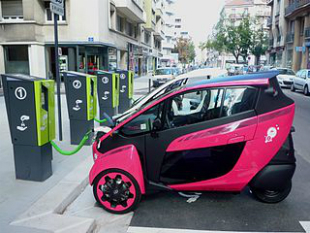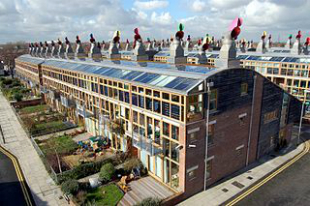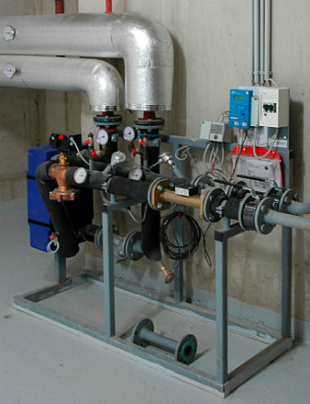Guest post by Christopher Kennedy, University of Toronto.
Over the past decade, I’ve analysed the greenhouse gas emissions for close to 30 global cities - including work for the OECD and World Bank. I recently led a study of the energy and material use (aka the urban metabolism) of the world’s 27 megacities - with populations greater than 10 million people as of 2010. On top of that, I’ve used my training in engineering, economics, and business management - and experience as an industrial ecologist - to wrestle with the strategies by which cities around the world can massively reduce their greenhouse gas emissions.
The most likely answer - perhaps the only answer – is that it will entail widespread electrification, accompanied by use of low carbon electricity. I am by no means the only person to arrive at this conclusion. Looking at many of the national chapters of the UN work on 'Pathways to Deep Decarbonization', electrification is key.

(Credit: Milky / CC BY 3.0)
Electrification of cities means, for example, widespread adoption of electric vehicles in place of conventional petrol powered cars, and replacement of natural gas home heating systems with electrically powered ground or air source heat pumps. These technologies are rapidly becoming practical and affordable. For example, a recent study showed that the price of electric vehicle batteries is falling at a rate of 14% per year. The driving range for new electric car models - expected in 2017 - is comparable to conventional cars. There are already about 25,000 electric vehicles registered in the UK, and over 700,000 on the roads worldwide. Market share for new vehicles has reached ~15% in Norway and China plans to have 5 million by 2020.
Of course, for electric vehicles to actually reduce green house gas emissions from our cities, they need a low carbon source of electricity. To understand where they, or any technology for that matter, reduce emissions, it is necessary to take a life cycle perspective. This entails examining the emissions associated with the material extraction, production, use and disposal of the product. From reverse engineering a few life cycle studies of electric vehicles and other electrified products, a threshold of 600 t CO2e / GWh has been identified. Below this threshold, electrification reduces emissions relative to current fossil fuel technologies. The threshold is expressed in terms of the carbon intensity of the electricity supply – ie the amount of GHG emissions produced per unit of electricity generated.

(credit: Tom Chance/CC BY 2.0)
Cities in the UK are relatively well positioned to transform into low carbon electric cities. The carbon electricity of the UK grid is currently around 400 t CO2/GWh, and this should continue to fall in coming years. Even at the current value, UK cities can reduce emission through electrification. Cities in the UK also have relatively high population densities, compared to those in North America and Australia. This means that other strategies such as community energy systems and trams (as well as increased walking and cycling) can be affordable and effective. Nevertheless, it will take a sustained effort over many years to make the transition to low carbon cities, as infrastructure systems typically tend to become locked-in. For this reason, design of the infrastructure is one of the most important issues for developing cities.

(credit: Ulrichulrich/CC BY-SA 3.0)
The greatest challenge for electrification of cities, however, will be making them resilient to climate change. If electricity becomes our sole or predominant source of energy, then what happens during power cuts? Future urban energy systems will need to have some buffering capacity, which is today provided by the diversity of energy sources. (You can still make tea by boiling water on the gas hob when the electric kettle doesn’t work). Resilience may be provided by electric batteries (eg in the electric cars), biofuels, or hydrogen or other fuels produced during periods of excess renewable generation. There could also be multiple electric grids. If cities can overcome this resilience challenge, then perhaps we can live together in electric dreams!
Many of the concepts discussed here - GHG emissions from cities, the importance of the life cycle perspective, environmental impacts of UK cities, and future technologies and infrastructure for reducing emissions - are further described in the report 'Urban metabolism: a review in the UK context'.
Featured image adapted from a photograph by Carol M. Highsmith on Wikimedia.
Sign up for email alerts from this blog, or follow us on Twitter.

2 comments
Comment by iamsmith posted on
Recently promotion of electric vehicles gone up the support campaigners are getting from public and environment protection NGO giving the fuel to alternative use of energy instead of fossil fuel. here is the link with more details on industry overall review for 2016 https://www.articlepole.com/articles/28/exploring-the-future-of-used-car-market-in-the-uk.php
Comment by john posted on
I recently come across the a study report by BBC about WeBuyCarsToday.com i was surprise to see the spike in used car market. Buying and seeling of automotive in the UK is on its peak. But from my stand point as you rightly hihlighted the part of electricfication of cities is widly spread in cities now the following BBC report will give a little overview of that.
You can find the report here http://www.bbc.co.uk/news/business-34383082